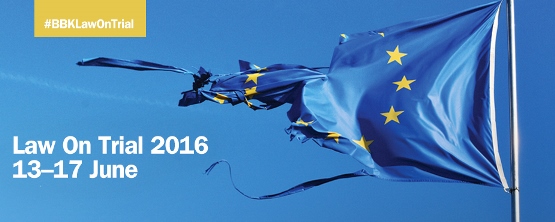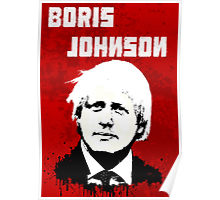This post was contributed by Michelle Everson, Professor of Law at Birkbeck. She has written widely on European Economic and Constitutional Law and has advised the European Commission, the European Parliament and the European Central Bank on matters of European Law.
Professor Everson is hosting a week long debate on ‘Europe at the Crossroads’ at Birkbeck (13-17 June). For details and to book your place, please visit the ‘European Law on Trial’ website.
Every day this week, Professor Everson writes for Birkbeck Comments, offering up her thoughts, opinions, and analysis on the EU referendum.
Order in chaos
Assaulted on all sides by a vilely-tempered and wholly ill-informed Brexit ‘debate’, I ask myself daily why I am going to Vote Remain. I may be known as a Professor of European economic and constitutional law, but do not belong to the ordinarily-rapturous academic fan base for the European Union. Quite the country, the determination of all-too-many of my colleagues to view the EU only through rose-tinted lenses confounds me, and always has done. From the 1980s onwards, when, as a PhD student, I discovered in my own research that European integration was synonymous with a process of the disintegration of intricate historical-political accommodations, social mores and economic interest-balancing at the national level, my default appreciation of the Union has been one of suspicion. In the meantime, as the EU has been engulfed in financial and sovereign debt crisis and has been unable to respond coherently to migration crisis, my critique of the current deeds of the Union makes many a Brexit campaigner look moderate.
From the destruction of political choices within the regime of economic austerity constructed in the effort to contain sovereign debt crisis (European Stability Mechanism and Fiscal Compact), to the reduction of Greece to the colonial status of dumping-ground within a punitive migration regime that is as dysfunctional as it is immoral, the EU has been found wholly wanting. Worse still, as the normally-sustaining European rule of law has collapsed within politically-expedient judicial law-making to sustain the Eurozone through constitutionalised imposition of economic conditionality (Thomas Pringle, heard by the Court of Justice of the European Union in 2012), the very ideal of Europe as a continent of justice, democracy and solidarity has itself been traduced.
Yet, the European Union, even, and perhaps especially so in its flawed current incarnation remains one of the most ambitious political projects ever conceived. Far beyond its original pragmatically-ideational roots within the post-war desire to bind national economies so tightly to one another that any future conflict would be an impossibility, and outside the delusional realm of federalist dreams (we, the people, simply do not want one), the Union also embodies an old-new ideal of order in chaos, or of self-determination beyond the self-referential reaches of territorial sovereignties. This is its inspirational strength, but perhaps also its real-world tragedy as it is caught up in the self-same paradoxes of all such universalising projects – be they of might (colonial), or of the mind (religious) – as it equalises differences between its constituent parts, and creates its own self-referential communitarianism through the seemingly inescapable definition of its own territorial boundaries.
The Brexit debate has been dominated by a fight about facts. In the one corner, those determined to catapult the UK out of the Union have been evermore inventive (read mendacious) in their pursuit of figures that putatively demonstrate the unbearable strains of integration upon UK population numbers and the Exchequer. In the other corner, Vote Remain’s assertion that a no vote will lead to economic shock is better backed up by reputable research, but the campaign is nonetheless careless in failing to highlight that all economic prognoses contain their own uncertainties. The debate has been sadly misdirected as each side seeks to present a ‘truth’ of statistics. By contrast, little or no attention is paid in to visions of how the global world, the EU and the UK within it, might be ordered for the good. Yet, while cost-benefit analysis of EU membership will, in any objective analysis, simply falter within the complexities of the balancing of trade or social benefits against their regulatory costs, our age of economic globalisation is urgently demanding our conceptual attention: what are its challenges, how can we tame economic powers that ignore national boundaries, is there a common good within this global world and, if so, how might we defend it?
For a present-day generation of people living within Europe, a generation long distanced from the absolute moral certainty of a post-war generation determined never again to break the peace, and, in its youthful global outlook, even less inclined to commit to a culturally-foreclosing European federalism, there is only one possible ideational vision of Europe to which they might commit: the search for an order in chaos, for a form of governing beyond closed national communities; an order which defies the inequalities created by unconstrained markets and capital, and an order which seeks also to establish justice, democracy and solidarity outside the certainties of a once-sustaining but now illusionary territorial (national) sovereignty. The European Union of 2016 is not the European Economic Communities of 1958, having morphed from an international community of market building into a supranational body of ever closer Union between its peoples. Nor is the European Union of 2016 a happy or uncontroversial one, as efforts to save the Euro feed the pressure for ‘more Europe’, but simultaneously undermine the political and social values that must always be a part of the European project.

Professor Michelle Everson
Yet, throughout its history and still today, the European project has been the drawing board for a sustainable ideal of civilised internationalism. That Europe is and always will be beset by its own contradictions of equalisation and boundary-drawing, or that it seems, currently, to be complicit within rather than controlling of the economic forces that are globally threatening to overwhelm all human (non-economic) self-determination, are happenings that simply cannot be denied. At the same time, however, Europe’s current malaise cannot and should not be taken as reason to walk away from the best enunciated and most practised iteration of the search for order in chaos offered by any post-national organisation now operating on the global stage. Instead, we must learn from Europe’s failures in order to fight within the EU for all of the advantages of order in chaos; for opportunities of human innovation on the one hand (rights of engagement within markets), and for the securities of self-determination on the other (rights of control over markets).
Law on Trial 2016: The European Union at the Crossroads, runs at Birkbeck from Monday 13 to Friday 17 June. Book a free place here.
Listen to Professor Everson on the topic of the EU referendum in the latest edition of Birkbeck Voices
This post represents the views of the author and not those of Birkbeck
Find out more





